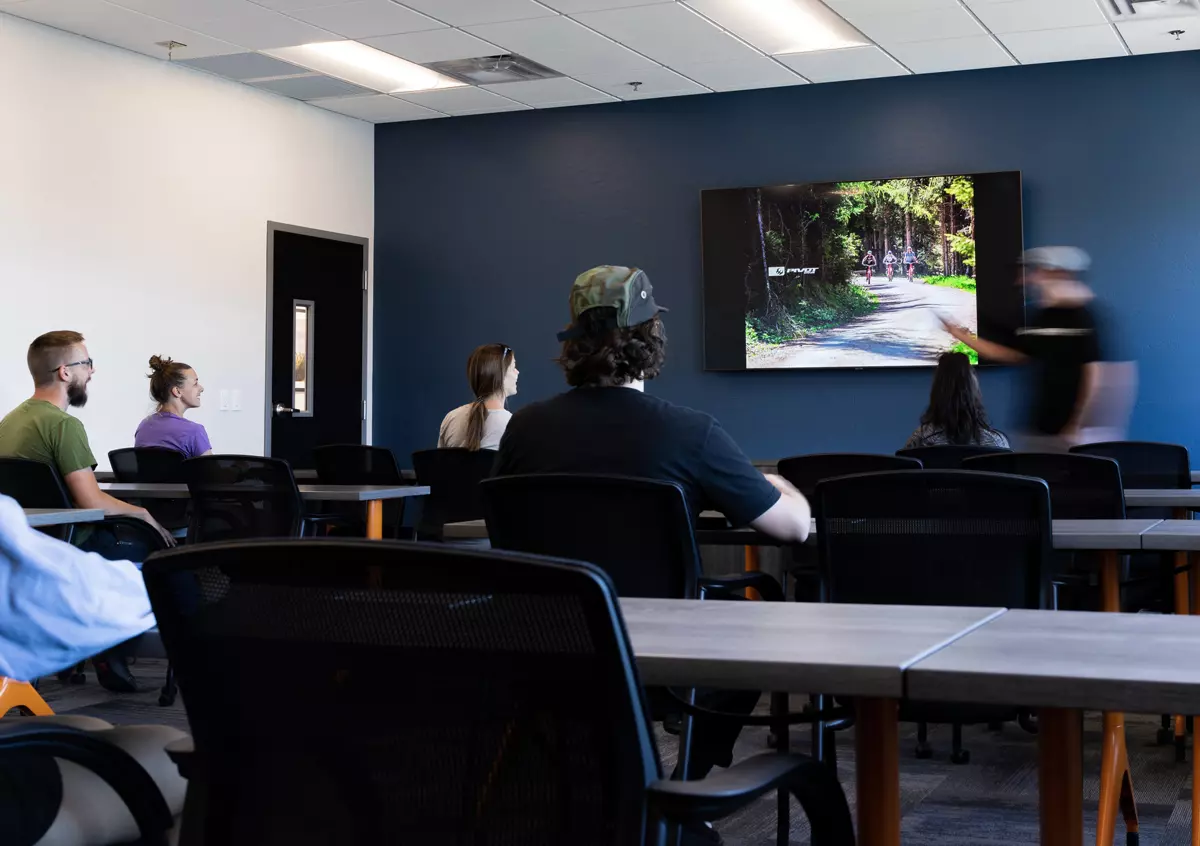Turn Your Brain Off
Pivot Cycles x Āhua Psychology x Kelsey Timpany
The flow state.
It’s a destination that all racers and riders seek. A crossroad between clarity, skill, and focus. The paradox is – it only exists in the now. You only feel it when it’s there and once it’s gone, it’s gone.
Have you ever had that moment when you are riding quicker than ever, turns come easy and your bike is an extension of your body?
Then the opposite. You feel like a beginner again. Twitchy. Wrong lines. Or as some riders call it, ‘squidding’. What happened to your flow state? It was there yesterday, but today it’s gone.
It would seem the answer for finding flow would be infinitely easy and just as hard.
Don’t think too much. Breathe. You’re breathing too fast. Count to three. Meter by meter. Drop by drop. Heart racing. Shaking. Shallow breathing. Pressure. Crowds. Risk. Focus. Immersed. Relief. Elation.
For Pivot Factory Racer,
Eddie Masters, his experience of flow state is near silence:
“When you are in flow state and have a mean run, you break the gate then cross the line. You don’t remember anything in-between, and you can’t hear any crowds. When you can’t hear the crowds, you know you’re doing something good.” – Ed Masters

There is no set formula,
and the coordinates are different for every rider. Registered Psychologist and Mental Skills Coach Taylor Rapley has worked with Olympians and World Champions alike. She is based in the Southern Hemisphere’s Mountain Bike Mecca, Central Otago, where all forms of biking is a crucial element of life.
“When a rider is under stress, a lot of fear and self-doubt can arise. Humans typically aren’t very good at accepting unwanted thoughts and emotions and as a result, we tend to perceive these experiences as negative – something we need to ‘fix’. People relate negative thoughts with poor performance and tend to do all they can to get into the ‘right mindset’ of ‘positive thinking’. This fear of fear, or fear of negative thinking paired with a fixation of needing to have ‘positive thoughts’ can be quite detrimental for a number of reasons.”
“When you try to get rid of thoughts and relentlessly control the stories your mind is telling you, these thoughts can become more intense, frequent, and distracting – creating a sense of not being in control. This excessive mental effort, also known as ‘over thinking’ can impair simple motor skills, such as riding over wet off camber roots that you would normally breeze over, choking during a race, or riding stiff, rigid and unlike yourself.” – Taylor Rapley
In psychology, this is talked about as the ‘Theory of Ironic Thought Processes’ and 'Reinvestment Theory'
Different theories with a similar concept suggest the more we try to control something, the less control we have.
Rather than perceiving unwanted thoughts as negative and investing all your energy into controlling your thoughts, Taylor suggests we embody strategies in aid of finding the desired flow state.
“Common psychological factors for high performance in my experience and based on research is psychological flexibility. This is an athlete’s ability to experience unwanted thoughts and emotions, while being able to separate oneself from those unwanted experiences and focus on the task at hand. Athletes who perform consistently and at a high level still have a tonne of difficult thoughts and feelings, but they’re able to make room for these thoughts and feelings so they can refocus and do what is important.” – Taylor Rapley
6 Simple tips for an overthinker from Taylor:
- Start by learning how to observe what your mind is telling you. You’ll start to notice the difference between what your mind is telling you, what is real, what’s important and what’s irrelevant. You’ll also notice that your mind does not shut up. And that the more distress you’re under, the louder it gets, the harder it is to quiet the mind.
- Name your thoughts as “The story I am telling myself is….” or “I notice that my mind is telling me…”
- Let the thoughts exist in your mind and accept that it is okay to be there for the moment, that your thoughts don’t define you or your outcome, and importantly, that you don’t always have control over what your mind is telling you. See the thoughts for what they are, be willing to allow, create space and then reconnect with your body.
- While we may feel inclined to try and fix our mindset with positive thoughts, that can be like trying to put a fire out with more fire or trying to fix the problem with the problem. Instead, let your body speak to your mind. A good exercise is 10 deep diaphragmatic breaths (in through the nose, out the mouth slow, controlled, and lengthy, pause, and repeat).
- Take a few moments to come back to your senses. With your eyes closed, notice what you can hear, and then open your eyes and notice what you can see.
- You can also do this with emotions. Name the emotion you’re experiencing, see if you can locate it in your body, visualise the feeling, breathe into it, make room for it, remind yourself that the emotion is allowed to be there. This type of emotional acceptance is aimed to help athletes become less afraid of their own emotions which can be game changing, especially when those emotions are quite big and distracting (i.e., fear).
In this sense, you are using the body-mind pathways to communicate with your brain that you’re actually all good and in control. This can open areas of the brain that have become impaired under stress, making it easier for you to refocus on what’s important and be present with the task at hand. This is where we find our flow!
For Eddie, music and routine is important before dropping in.
“At the top of the hill I put on my noise cancelling headphones and try to eliminate any thoughts other than being present at the gate. I will always fist bump Kurt before I head to the gate.”
“Leading up to a race I always try and bring it back to what I’m doing. For bike racing, nothing really matters for the three minutes you are on the track, so I try not to sweat the small stuff.” – Ed Masters
No matter how sharp your skillset is,
how fit and experienced you may be, your brain has the final say on your performance.
The feeling of being in top psychological performance and mastering the top two inches is that of euphoria. When you are one hundred percent focused and committed to the trail ahead of you. When hundreds of things could be going on around you and you had no idea, because you had simply – turned your brain off.
An important note from Taylor:
When you’re reading into all thing’s psychology (including these tips), it is important to recognise that information on the internet and books lack context and depth required to support you in your unique situation. Keep this in mind when learning about mental skills, and if you are unsure, seek further information from a registered and experienced professional.
You can find Taylor’s website and musings here: @ahuapsychology & ĀHUA Psychology (ahuapsychology.com). Taylor works with people and athletes in the scope of mental health and performance, offering her services 1:1 or in groups, both in person and online.




